Can Starmer keep hold of his party machine?
- Published
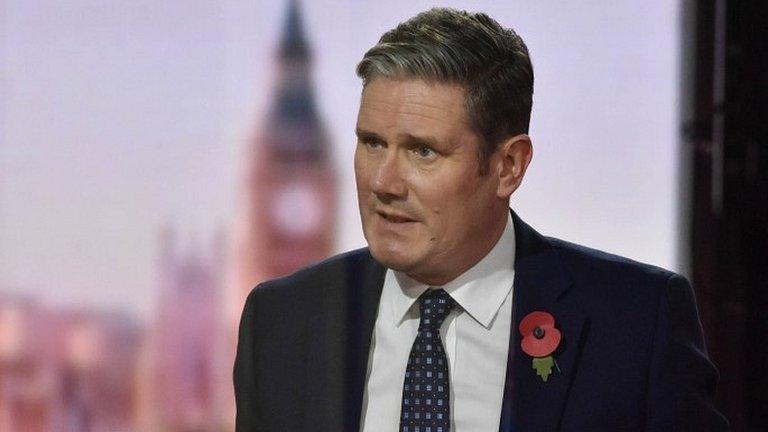
The UK's three biggest unions are changing leadership, while Labour's governing body has been holding elections. What does all this mean for Sir Keir Starmer?
Labour's ruling National Executive Committee - the NEC - matters.
It can help or hinder Sir Keir Starmer in his efforts to prove the party really is under new leadership.
And his control over it is on a knife edge.
The NEC brings together representatives from across the Labour movement - from the shadow cabinet, the parliamentary party, councillors, the unions and the grassroots membership.
Polling closes on Thursday for the election of nine grassroots members - along with the election of Wales, youth and disability representatives, and a party treasurer.
A BAME representative was elected separately and the Scottish Labour leader also sits on the body.
The election results - due out at 12:00 GMT on Friday - should be a clue to the party's future direction.
When left candidates - including Momentum's founder, Jon Lansman - swept the board early in 2018 in elections for the grassroots seats, it signalled that Jeremy Corbyn and his allies had finally gained control of the party machine.
Work to do
The NEC has a lot of contentious issues in its in-tray.
It will draw up rule changes designed to implement recommendations of the Equality and Human Rights Commission in tackling anti-Semitism.
It will also have to respond to a forthcoming report from the Forde Inquiry in to the party's internal culture.
This was set up following the leak of a report which claimed that the previous leadership had been undermined by party officials and argued that factional interests had undermined the election campaign.
And ultimately the NEC - or at least a panel drawn from its membership - could decide the political fate of Mr Corbyn, currently suspended from the party for suggested Labour's opponents had dramatically overstated the scale of anti-Semitism.
Balance of power
While Sir Keir has not lost any major votes on the NEC since his election in April, his hold is tenuous.
Two reps elected in the summer suggested a move away from Momentum - the group set up to support Jeremy Corbyn's leadership - was taking place at the grassroots.
The successful candidates came from the Labour To Win ticket - representing the "moderate" groups Labour First and Progress.
One of its declared aims is to "work together to make Keir Starmer's leadership a success".
Allies of Sir Keir say only 18 of the current 37 members are solidly reliable.
Some others - including the representatives of the GMB union - are usually helpful, but as one insider put it: "They usually want something in return."
So Labour to Win is looking for reinforcements.
But the method of electing representatives has changed from a first-past the-post system to a form of proportional representation, where candidates are ranked in order of preference.
The effect of this will be to make any result less clear-cut.
This change was backed by the party leadership.
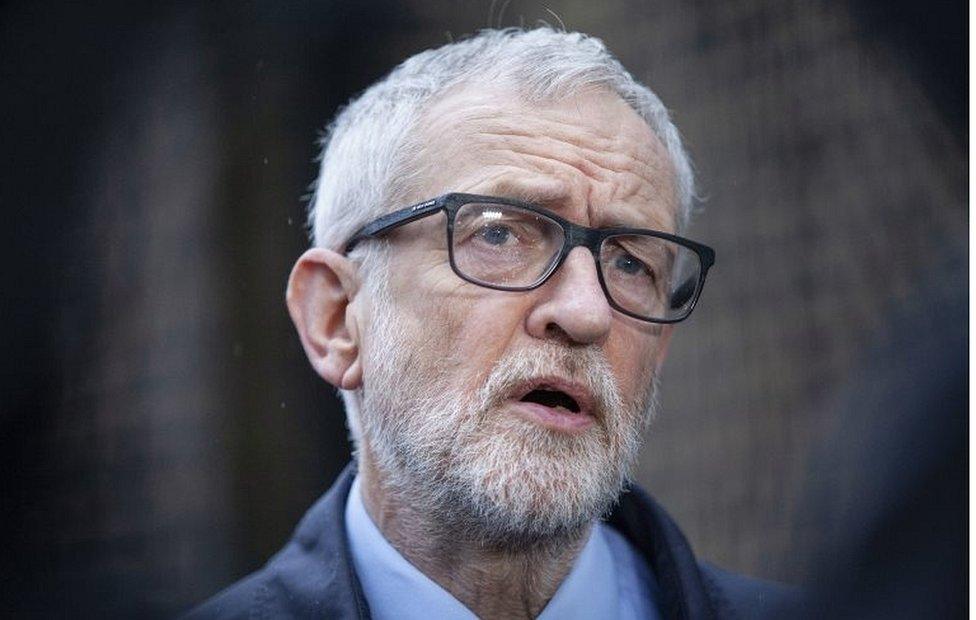
Jeremy Corbyn is currently suspended from the Labour Party
One staunch Starmer supporter said it was about "managing risk".
While the voting system would prevent Labour To Win from sweeping the board, it eliminated the risk of Momentum doing so too.
In other words, if there is a backlash against decisions taken by the new leadership, any damage would be limited.
So under the new voting system, we are likely to see Momentum's standard bearer and former MP Laura Pidcock elected, alongside the leading candidate from Labour To Win - Luke Akehurst.
He runs the Labour First group to help rally and organise critics and opponents of the Corbyn leadership.
One of its avowed aims is to ensure "the party is kept safe from the organised hard left". But it is less clear how well the rival camps will fare overall.
Momentum candidates are bullish about their prospects and believe the message of stopping a rightward drift will play well with the activist electorate.
Labour To Win does not lack confidence either. The membership has changed to an extent since the general election, as some Corbyn supporters have left the party while some of his opponents joined, or rejoined, to support Sir Keir's leadership campaign.
But if there are no clear-cut winners in the grassroots seats, the role of the NEC members appointed by the affiliated unions becomes more crucial.
Acting in Unison?
Three big unions affiliated to the party - and which generously donate funds to Labour - will also see a change of leadership over the next year or so.
Each has representatives on the NEC.
There's an imminent contest in the public service union Unison.
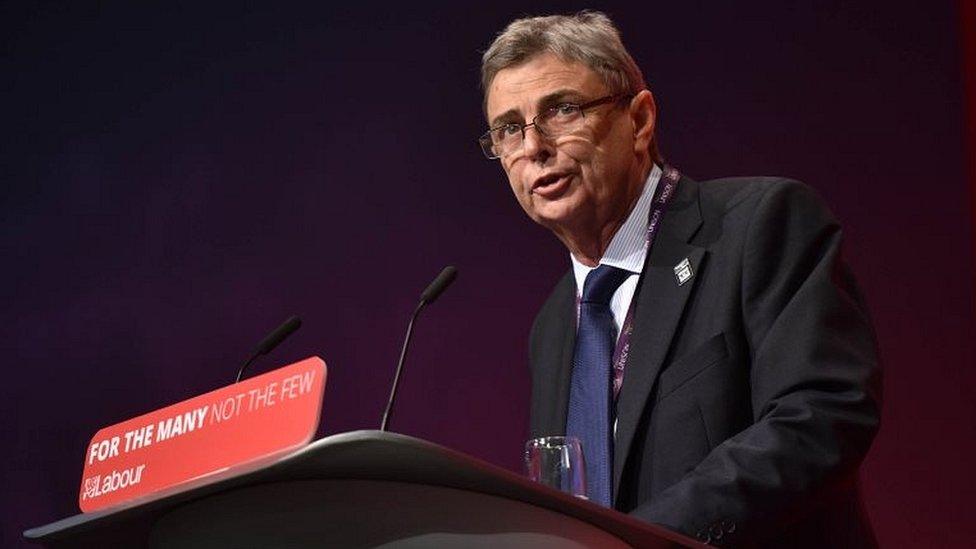
Outgoing Unison boss Dave Prentis has been a firm supporter of Sir Keir
Its 1.3 million members have been sent ballot papers and the contest closes on 27 November, with the winning candidate taking over from veteran leader Dave Prentis in the New Year.
Under his leadership, Unison nominated Sir Keir to become Labour leader, but it is by no means certain that another ally will replace Mr Prentis.
His favoured replacement is Christina McAnea - an assistant general secretary who has said she supports Sir Keir's leadership.
She has been nominated for the job (though not unanimously) by the union's executive committee and more than 200 local branches.
Ms McAnea grew up on a Glasgow council estate and her campaign has focused on what she can do to improve working conditions.
She is seen as a tough negotiator who has delivered for NHS staff.
And although a long-standing (though not lifelong) Labour member, union insiders say she does not see things through the prism of internal party politics.
But her elevation to the top job is not guaranteed.
She faces tough competition from Roger Mackenzie - another assistant general secretary and Unison's first senior official from a BAME background.
His candidacy has been endorsed by none other than Mr Corbyn - who said: "Roger and I have stood together on picket lines, on demonstrations together, and he did a huge amount of work supporting my leadership campaigns."
In a twist in the contest, the campaign group Labour Against Anti-Semitism has made a complaint against Mr Mackenzie to Labour headquarters, based largely on his social media activity.
He denies any anti-Semitic behaviour. The party is investigating.
And this week, complaints have also been made to Unison which sources say are "being looked into".
However, even were Mr Mackenzie to be suspended subject to investigation - and I'm told that's by no means certain - the union's rules would not stop him running for office.
His opponents believe that his profile has been boosted by his support for a campaign to reinstate Mr Corbyn.
If he too was suspended by either the party or the union, they fear that this may not derail his campaign.
Indeed, in an election where turnout among the wider membership is expected to be low, but higher among left-wing activists, he may actually receive a boost.
Another left-wing candidate is already suspended from the union, but is also taking part in the contest.
Paul Holmes - who is employed by Kirklees Council, in West Yorkshire - came third in the 2010 contest and has vowed to take his current £32,000 salary if elected, and not the six-figure sum that comes with the job.
He has campaigned to sell off the union's expensive London HQ.
The fourth candidate is Hugo Pierre, who isn't a Labour member.
He is backed by the Socialist Party, a successor organisation to the Trotskyite Militant Tendency, and is not expected to come close to winning.
It's a first-past-the-post election so with the left-wing vote split three ways, Ms McAnea remains favourite.
But if much of the activist vote were to coalesce behind Roger Mackenzie, things could all become politically more choppy for Sir Keir in the New Year.
Putting the house in order
An imminent change of leadership was also expected at the GMB union - the UK's third largest - following the departure of the previous general secretary Tim Roache amid allegations of misconduct. He said was resigning on grounds of ill health.
The timetable, though, has slipped following a devastating report by Karen Monaghan QC on the culture at the union. She found "bullying, misogyny, cronyism and sexual harassment" were endemic.
I am told that the union's ruling body has made dealing with this, and an internal probe in to the circumstances around the previous general secretary's departure, a priority - hence the delay.
A contest in March next year has been mooted but not confirmed.
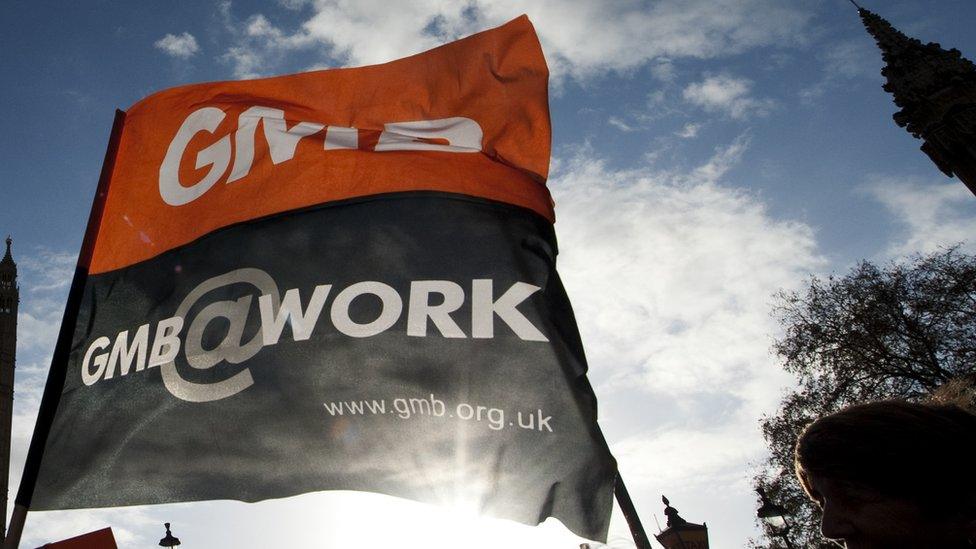
GMS is the UK's third largest trade union
Putting the union's own house in order is seen as more important than internal Labour politics.
A GMB insider suggested that any likely candidate would have to be informally "vetted" to ensure they were not tainted by any criticism.
However, the internal rumours are that the likely candidates will be the relatively youthful Scotland regional secretary Gary Smith, and union's public services lead Rehana Azam.
Given the strength of the Monaghan report, and the previous lack of women in the most senior positions, Ms Azam would most clearly represent a break from the past.
But neither candidate is thought to be problematic for Sir Keir, and newly installed interim general secretary Warren Kenny, son of the former GMB leader Sir Paul Kenny, is seen as convivial to the party leadership.
United We Stand?
Potentially the biggest problem for Sir Keir is if the leadership of the union most generous in its funding of Labour moves from being critical of him to downright hostile. Unite gave the party £3m in the run-up to the last election.
Current general secretary and Corbyn ally Len McCluskey has said he will stand down in 2022, though some in the union still believe he may go a little sooner.
In any case, the contest to replace him will begin next year.
One candidate - Howard Beckett, who already represents the union on Labour's NEC - has been enraged by Mr Corbyn's suspension.
He has said that "an attack on Corbynism is an attack on all of us".
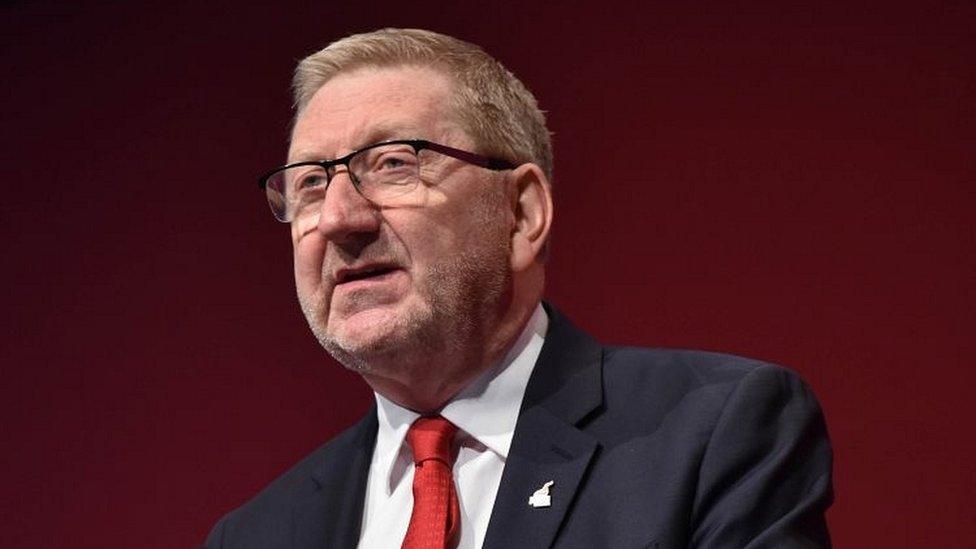
Len McCluskey has remained loyal to Jeremy Corbyn
Mr Beckett has advocated reducing the union's contributions to Labour and devoting cash to setting up a broadcasting rival to the mainstream media.
Unite already punches above its not inconsiderable weight on Labour's NEC and under his leadership he would, at the very least, also be throwing political punches at the current Labour leadership.
A left-wing rival - and the candidate of the union's United Left faction, Steve Turner - is seen as more willing to do deals with Sir Keir than act as a rival power base.
It is also likely that a member of the union's executive, Sharon Graham, also on the left, will campaign to become the first female general secretary, with a focus on improving her members' lot rather than seeking to get involved in internal Labour struggles.
But considering another attempt at the top job is Gerard Coyne, who challenged Mr McCluskey last time and lost narrowly.
A split in the left vote in a first-past-the-post contest could help him.
He was seen as close to Labour's former deputy leader Tom Watson after the latter's relations with Mr McCluskey soured.
This contest is likely to be dramatic and bitter - the NEC elections certainly won't be the last word in internal party disputes.
So if the NEC elections tilt Sir Keir's way and the contests in three biggest unions are ultimately won by candidates who are willing to be constructive, he could end up with an even more supportive party machine than his predecessor.
But his critics haven't gone away.
The contests could turn on very narrow margins and potentially make it more difficult for him to effect a change in his party's direction.